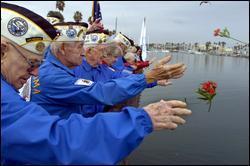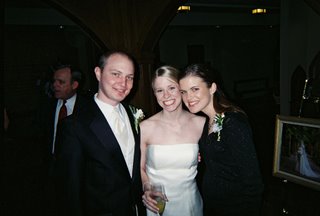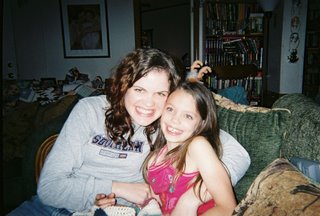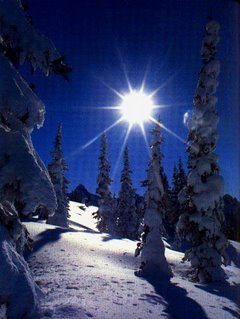PEARL HARBOR, Hawaii — This will be their last visit to this watery grave to share stories, exchange smiles, find peace and salute their fallen friends.
This, they say, will be their final farewell. With their number quickly dwindling, survivors of Pearl Harbor will gather Thursday one last time to honor those killed by the Japanese 65 years ago, and to mark a date that lives in infamy. "This will be one to remember," said Mal Middlesworth, president of the Pearl Harbor Survivors Association. "It's going to be something that we'll cherish forever." The survivors have met here every five years for four decades, but they're now in their 80s or 90s and are not counting on a 70th reunion. They have made every effort to report for one final roll call. "We're like the dodo bird. We're almost extinct," said Middlesworth, now an 83-year-old retiree from Upland, California, but then — on Dec. 7, 1941 — an 18-year-old Marine on the USS San Francisco. Nearly 500 survivors from across the nation were expected to make the trip to Hawaii, bringing with them 1,300 family members, numerous wheelchairs and too many haunting memories. Memories of a shocking, two-hour aerial raid that destroyed or heavily damaged 21 ships and 320 aircraft, that killed 2,390 people and wounded 1,178 others, that plunged the United States into World War II and set in motion the events that led to atomic bombings of Hiroshima and Nagasaki. "I suspect not many people have thought about this, but we're witnessing history," said Daniel Martinez, chief historian at the USS Arizona Memorial. "We are seeing the passing of a generation."
----- Former NBC anchor Tom Brokaw, who dubbed Americans who came of age during the Great Depression and World War II "the greatest generation," agreed to be keynote speaker for Thursday's ceremony. A moment of silence at 7:55 a.m. was to mark the time when the attack began. Martinez, the USS Arizona historian, likened it to another reunion 68 years ago — the final gathering of Civil War veterans in Gettysburg, Pennsylvania, when aging warriors in blue and gray shook hands and shared war stories. In 1938, as in 2006, the nation faced an uncertain future in a world gripped by conflict. "The passing of that generation had its moment and we're going to have ours," he said.
-----
My grandfather was stationed in Guadalcanal during WWII and wasn't able to see my uncle for the first three years of his life. My sweet grandmother kept in touch with her beloved husband as much as possible, writing love letters back and forth and wondering in anticif she would receive one in return. I remember listening to stories she would tell of the time when he was away, being toosed back and forth between the feelings of pride and fear. Very little was told from his side of the story--of the things he saw, battles he fought, comrades he saw fall. I cannot begin to comprehend what that season in history was like for them, and I am still amazed even though the Lord has called them both home in recent years.
This time in history moves me to reflect in a way much different than others. Because this generation of men is so significant in our nation's history, I begin wondering about other generations that have followed. What were these men who lived through WWII remembered by? What examples did they leave behind for their family and friends? How have other generations compared or contrasted to such sacrifice and bravery?
My other grandfather was overseas during the Korean War and so close to the action that he still gets choked up when attempting to recollect a certain event. His aim with a rifle is unbeatable, his love for country unmatched, and my family knows that comprehending his firsthand experience in Korea is unfathomable. He never talks about things he saw during his service.
When I fastward to today, to the generation by which I am defined in our society, I wonder at how we will be remembered. There are men and women my ages and younger fighting overseas as I type, and I get knots in my stomach whenever I hear of someone denegrating their service. I am not one to wave flags around, wearing shirts that say "God Bless America" or "I'm Proud to Be an American" on them, but I am mindful of the country in which the Lord has called me to live. This country spans the spectrum when it comes to pride versus humility or rights versus rules. I am oftentimes discouraged by the ways in which the media portrays the current war, and I can't help but wonder what it must be like for the individuals over there who here of such opposition. I am slow to being idealistic in thinking this country will ever be truly unified. Maybe that is why I look back at my grandparents' generation with such admiration. Even if there were select groups opposed to WWII during that period of time, individuals who rejected the idea of Americans getting involved in the war, they have largely been long-forgotten. The perseverance of noble, humble men is what remains embedded in our history and memories.
With that said, the question remains open-ended for a young woman in the midst of a postmodern, over-medicated culture: how will we be remembered by the generations to come?
















